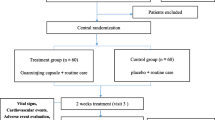Abstract
Objective: To assess the efficacy of the Coronary Heart Disease (CHD) Capsules worked out by Prof. Deng — in improving quality of life of CHD patients of qi deficiency with phlegm and blood stasis syndrome.Method: According to the WHOs diagnosis criteria of CHD, a total of 93 stable angina patients were divided into 3 groups using the single blinded method. The groups were evenly distributed into CHD Capsule treated group (CHDC), isosorbide dinitrate control group (ID), and Compound Prescription Danshen Droplet Pills control group (CPDDP). Two courses of treatment lasting for 6 months were given. During the courses of treatment, the following parameters were observed: clinical symptoms of angina pectoris, ECG change, treadmill exercise test, 36 items in short form of health survey (SF-36) and Seattle Angina Questionnaire (SAQ) scale.Results: After 6 months of treatment, all the three groups showed good curative effect in angina pectoris, ECG and treadmill exercise test, differences between them had no statistical significance. The CHDC group showed a better result in nitro-glycerine stopping or alleviation rate and in improving symptoms than the other groups (P<0.05). The general health, vitality, role-emotional, mental health and reported health transition in the CHDC group were significantly better than those in the control groups (P< 0.05). The scores in physiological functioningrole, physiological function and pain alleviation were not different among the three groups.Conclusion: Prof. DENG Tie-tao’s CHDC is effective in treating CHD with qi deficiency, phlegm and blood stasis and also in improving the quality of life. CHDC is more suitable to be used in long-term treatment than isosorbide dinitrate. The SF-36 and SAQ can be used to appraise the curative effect of traditional Chinese medicine agents for CHD angina pectoris.
Similar content being viewed by others
References
International Cardiology Association and Society and World Health Organization Clinical Denomination Standard Combined Subject Group. Ischemic heart disease denomination and diagnosis criteria. Chin J Cardiol 1981; 9(1): 75.
Wang JL. editor. Clinical epidemiology-Clinical scientific research’s design and measure and evaluation. 2nd ed. Shanghai: Shanghai Scientific and Technological Press, 2001: 369–373.
Wei CH. The application of the 36 short form of health survey. Foreign Med: Social Med Fascicle 1997; 14(4): 145–147.
Spertus JA, Winder JA, Dewhurst TA, et al. Development and evaluation of the Seattle Angina Questionnaire: a new functional status measure for coronary artery disease. J Am Coll Cardiol 1995; 25(2): 333–341.
Rao ZH, Yuan ZM. A new questionnaire for assessing the functional state of patients with CHD. Foreign Med: Gerontol Fascicle 1996; 17(1): 14–16.
National Symposium on Preventing and Treating Arrhythmia with Integration of TCM and Western Medicine. Coronary heart disease angina pectoris and ECG efficacy criteria. J TCM 1996; 37(10): 583.
Hu MY, Xu J. The application of quality of life in evaluation of pharmacodynamics. Chin Pharm J 1999;34(6): 363–365.
Fredric JP, William AD. Clinical cardiac rehabilitation; A cardiologist’s guide. Tianjin: Tianjin Science-Technological Translation and Publishing Company, 2000: 47–68.
Ware JE, Snow KK, Kosinski M, et al. SF-36 health survey manual and interpretation guide. Boston, MA: The Health Institute, New England Medical Center, 1993: 1–12.
Kim HK, Hisata M, Kai I, et al. Social support exchange and quality of life among the Korean elderly. J Cross Cult Gerontol 2000; 15: 331–347.
Li L, Wang HM, Shen Y. Development and psychometric test of a Chinese version of the SF-36 Health Survey Scales. Chin J Prev Med 2002; 36(2): 109–113.
Liu TX, Kong SP, Liao ZY, et al. The study of Seattle Angina Questionnaire to evaluating CHD patients functional status and quality of life. Chin J Behavioral Med Sci 1997; 6(2): 127–129.
CASS Principal Investigators and Their Associates. Coronary artery surgery study (CASS): A randomized trial of coronary artery bypass, quality of life in patients randomly assigned to treatment groups. Circulation 1983;68: 951–960.
Author information
Authors and Affiliations
Corresponding author
Additional information
Supported by Department of Science and Technology of Guangdong Province’s Document (No. 281)
Rights and permissions
About this article
Cite this article
Huan-lin, W., Xia, W., Xin-mei, L. et al. Trial study on DENG Tie-tao’s Coronary Heart Disease Capsules in improving patients’ quality of life. Chin. J. Integr. Med. 11, 173–178 (2005). https://doi.org/10.1007/BF02836499
Received:
Issue Date:
DOI: https://doi.org/10.1007/BF02836499



